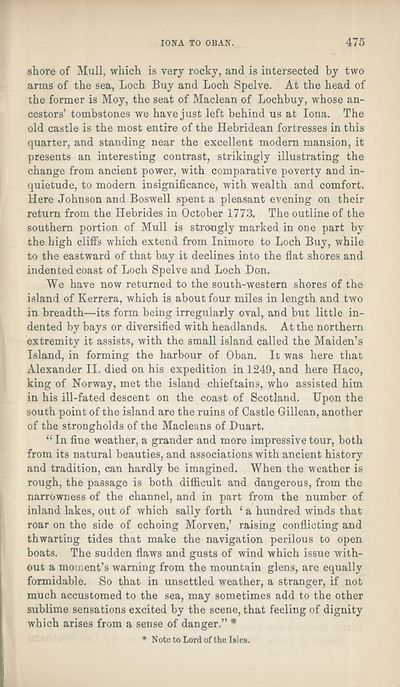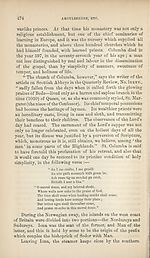Download files
Complete book:
Individual page:
Thumbnail gallery: Grid view | List view

IONA TO OBAN. 475
shore of Mull, which is very rocky, and is intersected by two
arms of the sea, Loch Buy and Loch Spelve. At the head of
the former is Moy, the seat of Maclean of Lochbuy, whose an¬
cestors’ tombstones we have just left behind us at Iona. The
old castle is the most entire of the Hebridean fortresses in this
quarter, and standing near the excellent modern mansion, it
presents an interesting contrast, strikingly illustrating the
change from ancient power, with comparative poverty and in¬
quietude, to modern insignificance, with wealth and comfort.
Here Johnson and Boswell spent a pleasant evening on their
return from the Hebrides in October 1773. The outline of the
southern portion of Mull is strongly marked in one part by
the high cliffs which extend from Inimore to Loch Buy, while
to the eastward of that bay it declines into the flat shores and
indented coast of Loch Spelve and Loch Don.
We have now returned to the south-western shores of the
island of Kerrera, which is about four miles in length and two
in breadth—its form being irregularly oval, and but little in¬
dented by bays or diversified with headlands. At the northern
extremity it assists, with the small island called the Maiden’s
Island, in forming the harbour of Oban. It was here that
Alexander II. died on his expedition in 1249, and here Haco,
king of Norway, met the island chieftains, who assisted him
in his ill-fated descent on the coast of Scotland. Upon the
south point of the island are the ruins of Castle Gillean, another
of the strongholds of the Macleans of Duart.
“ In fine weather, a grander and more impressive tour, both
from its natural beauties, and associations with ancient history
and tradition, can hardly be imagined. When the weather is
rough, the passage is both difficult and dangerous, from the
narrowness of the channel, and in part from the number of
inland lakes, out of which sally forth ‘ a hundred winds that
roar on the side of echoing Morven,’ raising conflicting and
thwarting tides that make the navigation perilous to open
boats. The sudden flaws and gusts of wind which issue with¬
out a moment’s warning from the mountain glens, are equally
formidable. So that in unsettled weather, a stranger, if not
much accustomed to the sea, may sometimes add to the other
sublime sensations excited by the scene, that feeling of dignity
which arises from a sense of danger.” *
* Note to Lord of the Isles.
shore of Mull, which is very rocky, and is intersected by two
arms of the sea, Loch Buy and Loch Spelve. At the head of
the former is Moy, the seat of Maclean of Lochbuy, whose an¬
cestors’ tombstones we have just left behind us at Iona. The
old castle is the most entire of the Hebridean fortresses in this
quarter, and standing near the excellent modern mansion, it
presents an interesting contrast, strikingly illustrating the
change from ancient power, with comparative poverty and in¬
quietude, to modern insignificance, with wealth and comfort.
Here Johnson and Boswell spent a pleasant evening on their
return from the Hebrides in October 1773. The outline of the
southern portion of Mull is strongly marked in one part by
the high cliffs which extend from Inimore to Loch Buy, while
to the eastward of that bay it declines into the flat shores and
indented coast of Loch Spelve and Loch Don.
We have now returned to the south-western shores of the
island of Kerrera, which is about four miles in length and two
in breadth—its form being irregularly oval, and but little in¬
dented by bays or diversified with headlands. At the northern
extremity it assists, with the small island called the Maiden’s
Island, in forming the harbour of Oban. It was here that
Alexander II. died on his expedition in 1249, and here Haco,
king of Norway, met the island chieftains, who assisted him
in his ill-fated descent on the coast of Scotland. Upon the
south point of the island are the ruins of Castle Gillean, another
of the strongholds of the Macleans of Duart.
“ In fine weather, a grander and more impressive tour, both
from its natural beauties, and associations with ancient history
and tradition, can hardly be imagined. When the weather is
rough, the passage is both difficult and dangerous, from the
narrowness of the channel, and in part from the number of
inland lakes, out of which sally forth ‘ a hundred winds that
roar on the side of echoing Morven,’ raising conflicting and
thwarting tides that make the navigation perilous to open
boats. The sudden flaws and gusts of wind which issue with¬
out a moment’s warning from the mountain glens, are equally
formidable. So that in unsettled weather, a stranger, if not
much accustomed to the sea, may sometimes add to the other
sublime sensations excited by the scene, that feeling of dignity
which arises from a sense of danger.” *
* Note to Lord of the Isles.
Set display mode to:
![]() Universal Viewer |
Universal Viewer | ![]() Mirador |
Large image | Transcription
Mirador |
Large image | Transcription
| Antiquarian books of Scotland > Scotland/Scots > Black's picturesque tourist of Scotland > (595) |
|---|
| Permanent URL | https://digital.nls.uk/130035330 |
|---|
| Description | Thousands of printed books from the Antiquarian Books of Scotland collection which dates from 1641 to the 1980s. The collection consists of 14,800 books which were published in Scotland or have a Scottish connection, e.g. through the author, printer or owner. Subjects covered include sport, education, diseases, adventure, occupations, Jacobites, politics and religion. Among the 29 languages represented are English, Gaelic, Italian, French, Russian and Swedish. |
|---|

